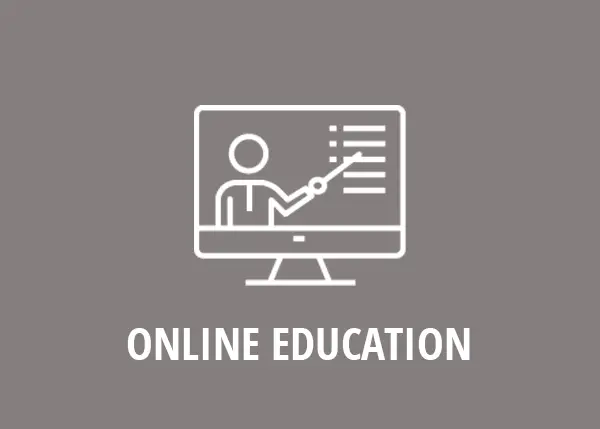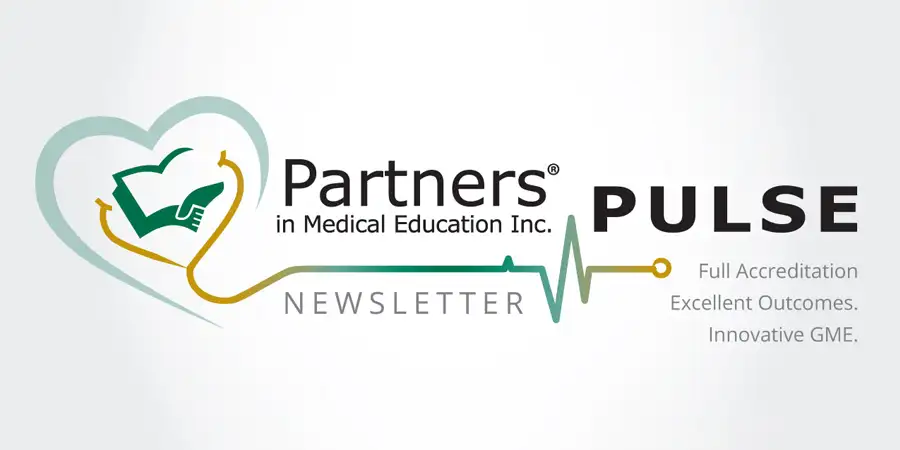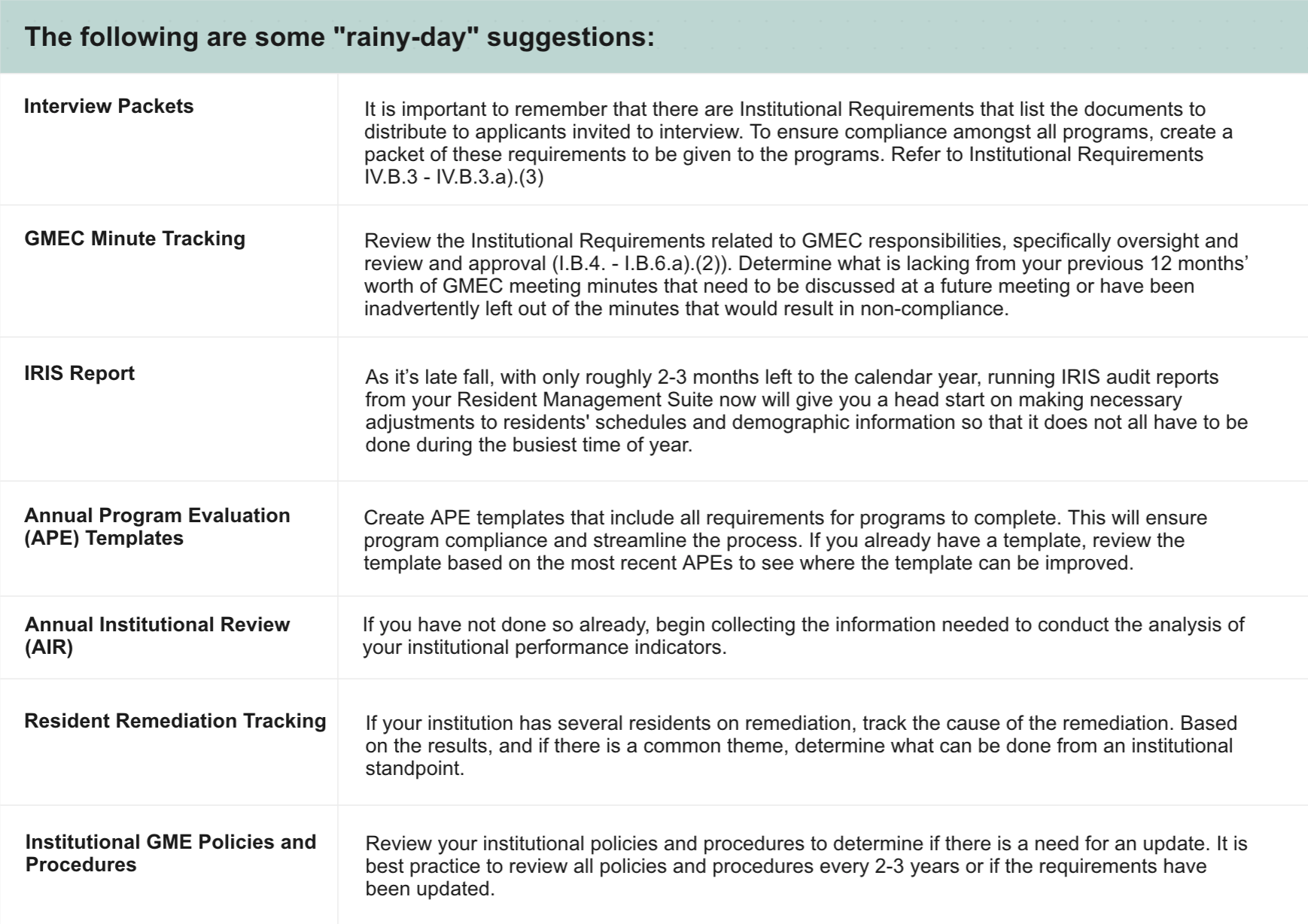Jump to Article
Sponsoring Institution
Program
GME Office / Administration
Finance / Public Policy

Sponsoring Institution
By: Carmela Meyer, MBA, EdD Carmela@PartnersInMedEd.com
It’s time to AIR it out.
The Accreditation Data System (ADS) Update is behind us and it’s time to begin work on the Annual Institutional Review (AIR). Unfortunately, the value of accreditation requirements is undervalued by your GME staff due to the sheer volume of work on your plates in the fall – recruitment, annual program evaluations, and mid-year evaluations. Eliminate some of the stress by using a portion of your Graduate Medical Education Committee (GMEC) meetings to meet two of the AIR requirements: GME mission and the SWOT.
GME Mission: As educators we understand the value of reflection for our learners. The AIR is an opportunity for the GMEC to reflect on the effectiveness of the GME program over the past year. Reflection provides us with the opportunity to ensure the GME programs are working together to achieve and support the mission of the institution. Have world events changed our priorities? For example, how did COVID-19 or recent Supreme Court rulings impact the role of GME in your institution and does your mission still align with those priorities?
SWOT: One activity that is useful (and fun!) is to complete the SWOT as a GMEC. The SWOT is a valuable tool that helps align priorities with the mission resulting in mission-driven action plans for your AIR. You will end up with a sizable number of items that can easily overwhelm the committee. One way to drill down to the most important items is:
SWOT Priority Voting: Each GMEC member votes for their top three priority items within each of the SWOT areas. Combine this list in order from most votes to least. Take the top three of the weakness, opportunity and threat areas and vote for the top three of those. The last step is to pick 3-5 of those items to address in your action plan. The resulting discussion, and list, will provide insightful, actionable items for your AIR.
So, this year, as you plan your AIR, spend a little more time focusing GMEC discussion on the GME mission and the SWOT can inform your AIR action plans.

Program
By: Tori Hanlon, MS Tori@PartnersInMedEd.com
Program Aims and Recruitment
As programs are in the thick of recruitment season, program aims might not be something that’s in the forefront of your mind. However, the program’s aims are not just for the program Self-Study but can aid your program during recruitment. The ACGME defines program aims as “program and institutional leaders’ views of key expectations for the program, as well as how the program differentiates itself from other programs in the same specialty.”
Aims may describe a curricular focus, such as research or primary care, or may identify the patient population or clinical environment the program prepares trainees for. This can be a valuable tool for recruitment to communicate to applicants the types of trainees and training your program is focused on. Program aims also allow applicants to better determine whether your program is right for them.
Per ACGME Requirements, program aims must be made available to program applicants. It is suggested programs display their aims on their website. Additionally, programs should include aims as part of the material they cover during interviews, either in documents given to applicants or in presentation slides. Thinking about aims as a tool for recruitment not only allows programs to enhance their recruitment process, but also helps find applicants who are the best fit for your program.More information on program aims can be found on the program Self-Study page of the ACGME website, Self-Study (acgme.org).

GME Office / Administration
By: Amy Durante, MHA Amy@PartnersInMedEd.com
The GME Office “Rainy Day” Agenda
While the work is never done, there does tend to be a small window of time in the GME office when things seem to settle down and get just a bit “slower”. This time can differ from institution to institution however it tends to fall, for the most part, in October/November, during residency interview season. The Annual ADS Updates have been submitted and the Program Directors and Program Coordinators are so consumed with interviews that unless something out of the ordinary comes up, the GME Office personnel experience less interruptions. Here are some ideas to streamline GME processes and get a head start on other items to help the rest of the year run smoothly — before it is that insane time of year again, also known as “onboarding season.”
(Click within table to enlarge/clarify)
Whether you choose to tackle one or several of these items you certainly won’t regret it.
Finance / Public Policy
By: Christine Redovan, MBA, MLIS Christine@PartnersInMedEd.com
GME Bills in Congress – Fall 2023
Congress will be voting on quite a few GME items this Fall. Let’s look at a few of the major bills related to GME that will affect our programs.
S.1302 – Resident Physician Shortage Reduction Act of 2023
This bill would increase the number of funded residency slots by 14,000, 2,000 slots per year between 2025 – 2031. There would be an application process with slots distributed by a pre-set level of importance/order set by congress. Click here to follow the bills progress.
H.R. 751 – Fair Access in Residency ACT
This bill would require hospitals that participate in CMS reimbursement to submit information related to osteopathic and allopathic residents in their GME programs beginning in 2024. It is expected that hospitals would submit the number of each type of applicants and the number of each type accepted into their programs. Additionally, hospitals would have to equally accept USMLE and COMLEX scores. Click here to follow the bills progress.
H.R. 3046 Medical Student Education Authorization Act of 2023
This bill would provide funding for a period of five years to public institutions (i.e., public medical schools) that train and support medical students in primary health care for medically underserved communities. There is a hierarchy of criteria for the award and the public institution is required to provide at least 10% of grant in non-federal matching funds. The bill requests $150M for each of the fiscal years 2023 through 2025. Click here to follow this bill.
The next two bills are expected to be voted on, and hopefully extended, by the time you read this article. Both were set to expire on September 30, 2023. None the less, they are extremely important to GME and will be on the agenda again in a few years.
S.2308 Community Health Care Reauthorization Act
This bill includes the funding for what we commonly known as the Teaching Health Center Graduate Medical Education (THCGME) grant that supports many of our FM programs located in federal qualified health centers throughout the United States. The new bill hoped to increase funding amount and length of time. Click here to follow this bill.
H.R. 3841 To amend title III of the Public Health Service Act to reauthorize the program of payments to children’s hospitals that operate graduate medical education programs.
This bill renews funding through 2028 without any modifications. Click here to follow this bill.
H.R.3887 Children’s Hospital GME Support Reauthorization Act of 2023
This bill extends children’s hospital graduate medical education (CHGME) payments through 2028; however, it introduces language that would prohibit CHGME payments to hospitals providing gender-affirming care to minors. It includes a long list of prohibited procedures and hormonal therapies related to changing the body of an individual to correspond to a sex that differs from their biological sex. Click here to follow this bill.
 |
 |
 |




